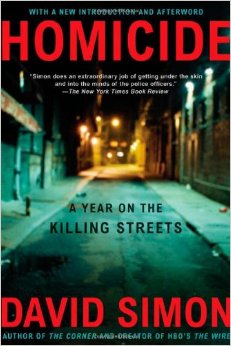
Laura Tillman's The Long Shadow of Small Ghosts offers an unforgettable look at the John Allen Rubio murders that happened in Brownsville, Tex., in 2003. Tillman, who focuses on Brownsville as much as the crime itself, picks a few of her favorite nontraditional true crime books.
Many great nonfiction books begin with a crime as their point of departure, and little more. Here are nine examples of master works that use the premise of a crime to explore themes like obsession, loss, ethics, race, and the American landscape.

1. The Orchid Thief by Susan Orlean
This chronicle of obsession began with a New Yorker piece about orchid-poacher John Laroche. The book that followed is a meditation on passion, Florida, and man's relationship with nature. Moving far beyond the initial hook of orchid-theft, Orlean writes, "Sometimes this kind of story turns out to be something more, some glimpse of life that expands like those Japanese paper balls you drop in water and then after a moment they bloom into flowers, and the flower is so marvelous that you can't believe there was a time when all you saw in front of you was a paper ball and a glass of water." She delivers on that promise, bringing readers the treasures she found in Florida's swampland.

2. Men We Reaped by Jesmyn Ward
This exquisitely written meditation on race in America recollects the five young men, all black, whom Ward lost to tragedy over the course of a four-year period. As she conjures their memories, Ward also points to the systemic racism tied to each of their deaths. There are crimes of murder and drug use and drunk driving in the book, but its chief villain is the oppression hunting her loved ones down, "picking us off, one by one."

3. Random Family by Adrian Nicole LeBlanc
LeBlanc began what ultimately spanned into an eleven-year project when she started writing about heroin dealer Boy George in the Bronx. As she interviewed his associates, she became captivated by the women in his life, and embarked on what would become an unmatched chronicle of the cycle of poverty in a constellation of families. LeBlanc's immersion was complete, and it comes across in the reporting, which is stunningly detailed and consuming.

4. The Journalist and the Murderer by Janet Malcolm
With its provocative opening sentence, Malcolm begins her tour de force, a critique of reporting itself by a reporter who is engaged in the very act she analyzes: "Every journalist who is not too stupid or too full of himself to notice what is going on knows that what he does is morally indefensible." As she investigates the work of journalist Joe McGinniss and his book Fatal Vision, along with the trial that ensued after its publication, Malcolm delivers a mind-bending look at ethics in reporting that left the profession changed. It's worth noting that McGinniss heavily disputed her account.

5. Between the World and Me by Ta-Nehisi Coates
Published in the midst of an epidemic of police brutality that has rocked the nation, Ta-Nehisi Coates writes this letter to his son--a moving, harrowing essay on race in America that is at once a memoir and a premonition. The crimes that have been committed against black bodies are the book's central subject, and the possibility that his son could number among them its devastating concern.

6. Midnight in the Garden of Good and Evil by John Berendt
A writer moves to Savannah and becomes entangled with its dramas and subplots, the most suspenseful of which is a local murder. Savannah itself--gothic, gorgeous and dripping with intrigue--is the book's main character.

7. The Short and Tragic Life of Robert Peace by Jeff Hobbs
Hobbs was Robert Peace's roommate at their Ivy League college. After his friend died in a drug-related murder, Hobbs meticulously created this biography of his brilliant and charismatic friend, revealing in the process the double life he led. In getting to know Robert Peace, we feel the anguish that compelled Hobbs to begin his project: that a man's life could hold such promise and be destroyed with such purposelessness. In the process the enduring inequalities of our nation come into focus, as both its greatest opportunities and crushing oppression play out in the life of a single man.

8. Homicide by David Simon
In what would become the basis of a TV show and eventually his revered career in television, Simon's first book is immersion journalism at its best. A writer of great skill and verve, Simon captures the voices of the detectives of Baltimore's homicide unit with specificity and humor, and reveals the city through its daily tragedies.

9. In Cold Blood by Truman Capote
While this book fits readily into the true crime genre as its ultimate classic, part of its greatness can be found in the departures Capote makes from the murder of the Clutter family that brought him to Kansas. Capote reaches deeply into the lives of the characters, wisely delaying the crime until we've come to know the town, the killers, and the victims apart from the gritty details that have brought the reporter to the story.








